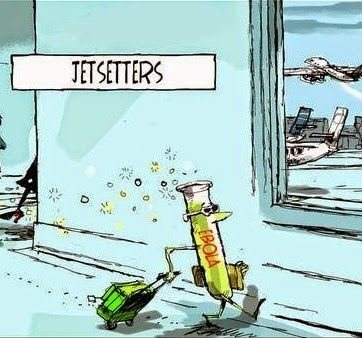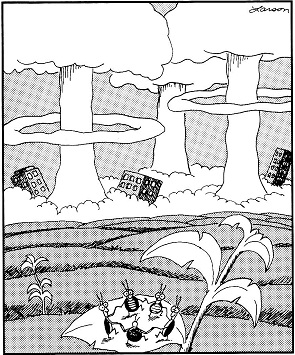 | |
| |
"Ye are the salt of the earth: but if the salt have lost his savour, wherewith shall it be salted?" says Matthew. In this case it is Rise Up I am thinking of so "if the yeast has lost its leaven" is more like it, more apt, 'apt-er'. Let's back it up, step away, far away ... Arthur-Clarke-2001-Space-Oddysey far; looking at our planet from the distance of, say, the moon; like the famous photograph taken by the Apollo 8 astronauts. And then, well, we've all seen those composite satellite photographs of night earth with cities glowing like cancerous flesh; and various overlays - the one of air traffic is good since that is one of the largest polluters.   I have a vision of a similar image showing methane emissions - burning lakes in the Northwest Territories, bubbling oceans. There's ignis fatuus, Latin, 'fire of fools'; with OED citations going back to 15th century ... so, from at least the Medieval Warm Period then; but this is the version where Chicken Little gets the Nobel Prize. Finally, with the idiot savant urban nitwit sensibility we can do an imaginary spiritual overlay to capture the flickering light from 20 million or so TV sets tuned to 'The Walking Dead'. This is probably more souls than are taking Christian communion at a given moment eh? It's not so far off a kind of 1% group (based on North American population of 400 million, 20 million viewers) less than one percent then but in that general range). By the time you factor in 'Dexter' and 'Breaking Bad', all the vampire guff and the rest you've got yourself a regular spiritual 'movement' large enough to entirely eclipse any pretentious concern with some fictitious environmental Armageddon or spurious threat of human extinction - though it does occupy approximately the same niche (so to speak, as it were), fires up in the same cerebral zones of the ol' brain-pan you can see in cognitive research MRI images when someone says the word 'God'. Ah but the script writing parties must be fun eh? Perhaps you don't even need drugs - things get aloft on free communing intelligence alone. At least at the beginning ... then it gets boring and has to be destroyed so the next incarnation can take over ... but who cares?  Even if you read John Doyle's 'piece in the Globe' (reproduced just below) carefully enough to see the fallacies and exaggeration, hyperbole, you may still be struck by a certain symmetry in the theories he presents, a certain je ne sais quoi resonance with the memes of Ragnarök. Globe: 10 reasons why The Walking Dead is a massive hit, John Doyle, Friday October 17. The viewer numbers are staggeringly high. And they just keep going higher. The raw ratings numbers for the Oct. 12 season premiere of The Walking Dead suggested a whopping 17.29 million viewers watched it on the cable channel AMC in the U.S. That was impressive. Then, late last week, the “live +3” ratings were revealed (that is, viewership by people who PVRed it to watch later, within three days of a telecast), and added five million to that number – 22.37 million total viewers. That puts the series up there with The Big Bang Theory (22.82 million) and even NFL football on Sundays (22.77 million). More than ever, The Walking Dead is a phenomenon. A must-see, mass-audience event. But why? Why is drama about a postapocalyptic zombie world so compelling? Herewith, 10 theories. You choose. 1) The overall theme – that humanity is doomed unless people learn to get along. And if we don’t get along, we’re just zombies feeding on each other. 2) It’s just cheesy fun – those ever-increasing armies of murderous zombies are the reason people watch. 3) Taciturn Georgia police deputy Rick Grimes (Andrew Lincoln) and a ragtag group fighting for survival represent us, every family or group of friends, terrified that the rest of the world is out to get us. 4) The infectious zombie virus is a stand-in for our fear of disease, from AIDS to SARS to Ebola. We’re essentially terrified of what can happen to our bodies when nature goes crazy on us. 5) The show is emphatically bleak, and many viewers like that. The survivors on the series merely go from one temporary refuge to another. The faint hope that elements of the old civilization can be rescued from the postapocalypse always evaporates. And faint hope only leads to heartache. Remember that period when the group lived at Hershel’s farm – it turned out that Hershel secretly kept zombies in the barn, some of them friends and members of his family. He believed that some semblance of humanity remained in their horrific shells, and that one day there would be a cure. There is no cure, he learned. There is no hope. 6) The overriding political theme. Recall that two mini-societies existed for a long period on the series. First, the tiny, frail group led by Rick finding safety in a prison. And, in contrast, the bizarre, fake town of Woodbury, under the leadership of the crypto-fascist Governor (David Morrissey). The clash of the two communities raised a question: Is it better to live in a blissful, mundane – but artificial – world under a dictator or be nurtured by the communal strength formed by constant pressure and danger? Fascism or freewheeling democracy? 7) It’s a revenge fantasy that speaks to some need in the viewer. People like nothing better on a Sunday night than watching other people stick a sharp object in a zombie’s head. Exactly who they fantasize is getting a sharp object in the head is their own business, but that’s what they’re thinking about. 8) We are entranced by the dreadful possibility of a world without order, communication or modern technology. And we fantasize about the probability of helping recreate society and culture from the ruins of destruction. 9) The postapocalypse world is a stand-in for our fear of economic collapse. Many viewers have seen economic near-collapse in our lifetime and we all worry that everything that sustains our jobs and lifestyle can fail. Every time we read about the stock market wobbling, we see a cataclysm in front of us. 10) The Walking Dead has torn up the blueprint used for most TV storytelling. It has been relentless in killing off beloved characters. Its seasons end with a cliffhanger, but begin again with yet more mystery and the kind of action that usually concludes a season. There is no careful threading of themes at the start of a season, it just gets going, roaring on all cylinders. The show is huge hit because it doesn’t play by the rules. There are 10 theories and the number could go higher, like the viewing numbers. You decide if it is one of the 10, or all of the above. I didn't watch much of it, just a minute or so until I grabbed the image above right from the first episode. Long enough to see that this is where the concern for grandchildren is blowing itself off. Dreck. On a par with reality TV I guess - can't say, never went that deep. The article below by Gwynne Dyer popped up in the meantime (following on from the discussion of oil in the last post, and speaking of ignis fatuus). He knows better than many of the statements in it. There is no 25 years. There is no nuclear fusion reactor in time. Yadda, yadda. He knows he'll be gone before these kinds of gross overstatement/understatement are proven useless. I don't blame 'im though. Take the money and run. Spend as much time on the beach with your honeys as you can. I might've done the same, stuck with more limpet determination in the brothels of the Barons, if I'd known when I walked away that it was into this kind of solidão / alone-ness (but much better in Portuguese eh?). How far will oil prices collapse—and for how long? Gwynne Dyer, October 20. “The price of oil will hit its floor and it will rise again,” President Nicolas Maduro assured Venezuelans, whose shaky economy depends critically on a high oil price. “Venezuela will continue with its social plans. Venezuela will move forward.” No it won’t, and neither will Russia, Iran, or Nigeria. The only major oil exporters that are not in deep trouble are the Arab countries, whose governments have some room for manoeuvre because of low production costs, relatively small populations, and big foreign currency reserves. Since June, the cost of a barrel of Brent crude, the benchmark for world oil prices, has fallen by almost a quarter, from around $110 a barrel (where it was stuck for the past four years) to just above $80 a barrel. Last month, for the first time in decades, Nigeria exported no oil at all to the United States. Even at a big discount, Americans just don’t need it. And the main reason for all that is fracking. American production has almost doubled in the past five years thanks to the new drilling technologies, and the United States overtook Russia last year to become the world’s largest producer of oil and gas combined. (Saudi Arabia comes a distant third.) With production soaring and world demand for oil stalling due to slow economic growth, a collapse in prices was inevitable. The question is how far they will collapse, and for how long. The answer is probably not much further, for the moment—but they could easily stay down in the $75 to $85 range for a couple of years. The reason for that is that the “swing” producers (mostly Arab), who could theoretically push prices back up by cutting their own production, have clearly decided not to do so. Their concern is for the long-term power of the OPEC cartel, which used to be strong enough to set the price of oil. That never will be true again unless they can drive the (mainly American) frackers who are causing the over-supply of oil out of business. Saudi Arabia and its allies are hoping that a prolonged period when the price of a barrel of oil is lower than the cost of getting that barrel out of the ground by fracking will ruin this new industry and bring back the Good Old Days. Dream on. The Saudi strategy won’t work because some 98 percent of U.S. crude oil and condensates has a break-even price of below $80 per barrel. Indeed, 82 percent of American production would still be turning a profit at $60 per barrel. Even with its massive foreign currency reserves, Saudi Arabia probably cannot afford to keep the oil price low enough for long enough to break the American frackers. (Its own break-even price for conventional oil is $93 per barrel.) And the Iranians, Nigerians, Venezuelans, and Russians, who depend on oil revenues for at least half of their national budgets, will be screaming for higher prices before they face riots in the streets. So this is not a transient event; it’s a revolution. The Organisation of Petroleum-Exporting Countries (OPEC) came into its own when the United States ceased to be the dominant global producer in the early 1970s. With the re-emergence of the United States as the biggest producer, OPEC’s clout is bound to shrink—so oil prices will probably stay well below $100 a barrel for the foreseeable future. This will be a great boon for countries that depend heavily on imported oil, like India and China. It may eventually liberate the United States from its compulsion to intervene repeatedly in Middle Eastern disputes that are really none of its business. And it may be a disaster for repressive and/or corrupt regimes in countries like Russia (break-even price $105 per barrel), Nigeria ($119), Venezuela ($121), and Iran ($140). It also means that worries about “peak oil”, and the underlying calculation that the world had only about 40 years’ worth of proven oil reserves left, can be set aside for a while. We are already up to 53 years of reserves, and we are finding new oil faster than we are using existing reserves. Of course, a broader view of our situation would find little reason for rejoicing in all this. Our global civilization depends on fossil fuels for 85 percent of its energy, and our annual emissions of carbon dioxide and other greenhouse gases are still rising. Just another 25 years of that will deliver us to the “point of no return”: 450 parts per million of CO2 equivalent in the atmosphere. That would raise the average global temperature by 2 degrees C, and trigger natural sources of warming that it will be impossible for us to turn off again. Runaway warming is not a happy prospect, so it is unseemly to celebrate the news that we have even more oil to burn—and cheaper oil, at that. On the other hand, it would be entirely appropriate to celebrate the news that other new technologies may open up a better escape route from fossil fuels. Solar power, wind power, nuclear fission, and hydro power all have a role to play in that task, but the Holy Grail for half a century has been fusion power. It may be much closer than we thought. Bottom Line: What to say? The environmental movement in Toronto consists of a hundred or so individuals with no cohesion, not much common purpose, and a variety of pathological impediments to communication. This is about the same as saying there is no environmental movement in Toronto. A handful, maybe a dozen, are shining lights, well-informed, competent, compassionate, experienced, open. I wish them well. That's an exit line y'unnerstan'. I spent five years, almost six, and all the money I had and I'm done.   "At any given moment there is an orthodoxy, a body of ideas which it is assumed that all right-thinking people will accept without question. It is not exactly forbidden to say this, that or the other, but it is 'not done' to say it, just as in mid-Victorian times it was 'not done' to mention trousers in the presence of a lady. Anyone who challenges the prevailing orthodoxy finds himself silenced with surprising effectiveness. A genuinely unfashionable opinion is almost never given a fair hearing, either in the popular press or in the highbrow periodicals." (The Freedom of the Press, George Orwell/Eric Blair, 1945.) |
[Up, Down]
















 The FAO bean counters MUST be dissembling as the Food Price Index continues to slide - going down for six straight months now. (?) Doesn't make sense to me.
The FAO bean counters MUST be dissembling as the Food Price Index continues to slide - going down for six straight months now. (?) Doesn't make sense to me.























